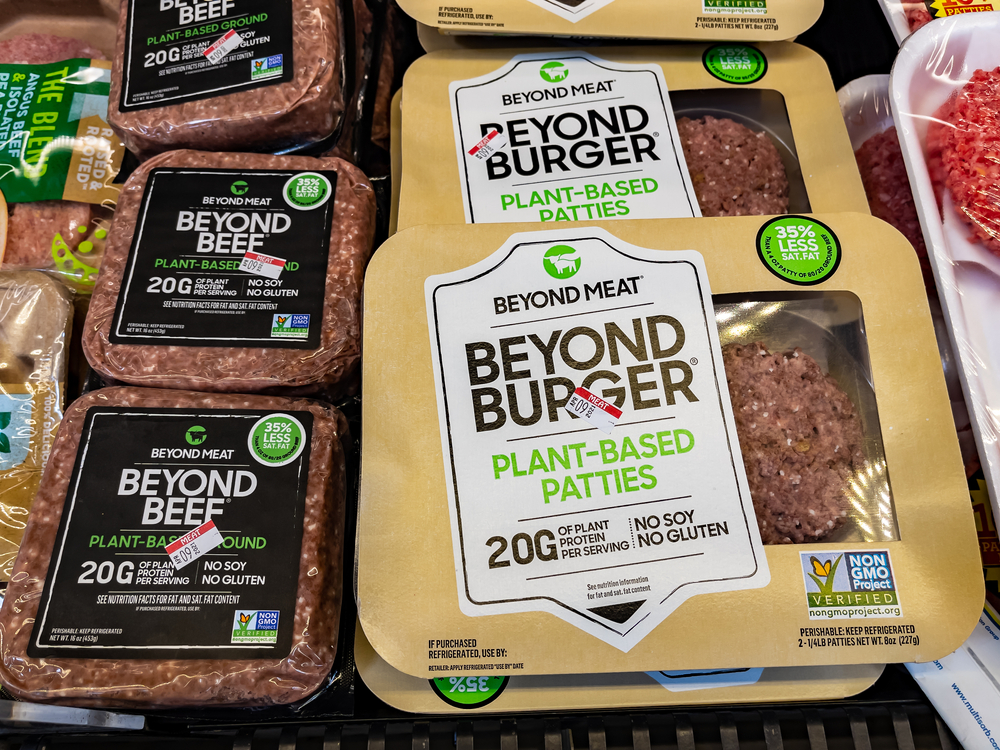Is Beyond Meat Healthy? A Dietitian’s Take on Plant-Based Protein

Are plant-based protein options like Beyond Meat healthy alternatives to red meat? The answer is nuanced and depends on a few factors
Plant-based meats are hitting the markets in greater numbers than before. You may have heard of Impossible Burger, Beyond Meat and Boca, just to name a few. Consumers of these meat alternatives often have health, the environment, or animal rights in mind. Beyond Meat has a different nutritional composition than animal meat. We’ll take a look at the major nutritional differences between plant-based options like Beyond Meat and animal meat to help you make your decisions when shopping for your protein.
What Is Beyond Meat?
Beyond Meat was founded in 2009. Their focus is to create meat alternatives made from plants with a mission to reduce the environmental impacts associated with traditional meat production. They aim to do so with as few ingredients as possible while maintaining a high-quality taste.
You can find the ingredients of one of the Beyond Meat products, Beyond Beef, here.
How healthy Is It?
Eating a plant-based diet is known to reduce the risk of many chronic diseases such as heart disease, diabetes mellitus and cancer. The term plant-based is used to describe a vegan diet, vegetarian diet or a diet that is omnivorous but with an emphasis on eating plenty of plants. A popular omnivorous diet that is also plant-based is the Mediterranean diet, which you can read more about here. Whether you are vegetarian, vegan or omnivorous, knowing the nutritional differences between plant-based meat and animal meat is important for your health.
Vitamins & Minerals
Animal meat, specifically beef, is naturally rich in B vitamins, especially B12. Vitamin B12 is essential for making protein, red blood cells and DNA. Not having enough vitamin B12 can contribute to anemia, gastrointestinal issues and neurologic issues. This vitamin is found in its most bioavailable form in animal products. Many plant-based meats, including Beyond Meat, add this vitamin to their products.
Zinc is naturally present in animal meat. 100 grams of ground beef will meet 57% of your daily needs for zinc. Zinc is an essential mineral that regulates gene expression. It supports your antioxidants and plays a role in immunity, growth and development, and reproductive capacity. Beyond Meat adds zinc to its products to mimic the nutrients one would obtain from animal meat.
Overall, many plant-based meat companies add vitamins and minerals to their products. It is important to check the ingredients list on the label to make sure they have added B vitamins and zinc.
Protein
Getting plenty of protein is essential for overall health. Adequate protein helps protect your muscle mass which helps increase your independence and longevity. Four ounces of ground beef has 22 grams of protein which is comparable to Beyond Beef’s 20 grams of protein.
Plant proteins have a lower amount of leucine, methionine and lysine as compared to animal proteins. These amino acids are essential for the making of proteins that involve DNA, enzymes and hormones.
Beyond Meat primarily uses pea protein in the ingredients. Pea protein is higher in leucine than other plant proteins but is still low in methionine. Your body depends on methionine for making DNA. The human body cannot make methionine on its own. Therefore, it’s essential to get it from food sources. It is most prevalent in animal meat and dairy. There are vegetarian sources of methionine such as soybean, but it’s not as high as in animal products.
L-Carnitine is a molecule that your body needs to use fat for energy. Animal meat, especially beef, naturally has L-Carnitine in its composition. However, your body can make L-Carnitine if it has methionine and lysine to work with. This is an important point for those seeking to lose weight as L-Carnitine directly brings fat molecules into your mitochondria to be used as energy. Some researchers are looking into how carnitine supplementation can affect fat utilization during exercise, but that is still being researched.
Is It a Processed Food?
The term processed foods can be scary. Anytime a food is changed from its original form, it is technically processed. However, there are different levels to how processed or changed a food becomes. Typically, when people think of processed foods, they’re thinking of ultra-processed food such as Twinkies, cookies, chips, candy, etc. These are examples of eating food that is the most changed from its original form. Yet, even bagged salads, canned vegetables and nut butter can be considered processed foods, just not as much as the ultra-processed items.
Plant-based meats are considered a processed food because they are largely changed from the original form of the ingredients. Additional ingredients, such as seed oils, are added to make the product seem more like animal meat. Seed oils include canola, corn, sunflower, safflower, soy, grapeseed, rice bran and cottonseed. In its purest form, extracting oils from these foods includes squeezing the seed in a way in which the oil comes out, which would be considered a cold-pressed oil. Most of these oils are processed further to make them shelf-stable, tasteless or able to tolerate high cooking temperatures.
Seed oils are considered an inflammatory food because they are higher in omega-6 fatty acids. These fats, if in excess, can increase free radicals and inflammation. Consuming adequate omega-3 fatty acids can mitigate the effects of omega-6 fats. The standard American diet tends to be high in omega-6 fats and low in omega-3s. Eating fatty fish a few times a week or taking an omega-3 supplement can help lower underlying inflammation.
Conclusion
There are several ways to eat a plant-based diet. It’s important to be informed on what plant-based meats offer and how to look for brands that provide the proper vitamins and minerals. Always check the ingredients label to ensure they’ve added B12 and zinc to keep you healthy. Plant proteins are lower in certain amino acids that we need to stay healthy. Having a wide variety of protein sources is one strategy that can help you get all the amino acids you need. Remember that plant-based meats are a processed food and may contain inflammatory additives if your diet is low in omega-3 fats.
This article is for informational purposes only and should not be used without the advice of your doctor. It does not claim to treat or cure health conditions.



